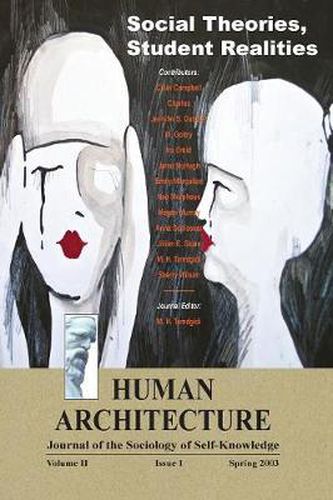Readings Newsletter
Become a Readings Member to make your shopping experience even easier.
Sign in or sign up for free!
You’re not far away from qualifying for FREE standard shipping within Australia
You’ve qualified for FREE standard shipping within Australia
The cart is loading…






This Spring 2003 (II, 1) issue of Human Architecture: Journal of the Sociology of Self-Knowledge include student papers from coursework completed at SUNY-Oneonta. The creative efforts students display in advancing their sociological imaginations demonstrate the extent to which the best pedagogical strategies are those that rely on teaching their subject matter by encouraging students to draw upon the reality of their own lives in an applied way to learn various concepts and theories taught in class. Topics are: Editor’s Note: Social Theories, Student Realities,
Why I Smoke: Sociology of a Deadly Habit,
The Drinking Matrix: A Symbolic Self Interaction,
Theoretical Reflections on Peer Judgments,
It’s Worth Living in the World,
My Image Struggles in Capitalist Society,
It’s Not My Fault Overcoming Social Anxiety through Sociological Imagination,
Treading Water: Self-Reflections on Generalized Anxiety Disorder,
Sociology of Shyness: A Self Introduction,
Let Me Introduce Myself My Struggles with Shyness and Conformity,
Religion in an Individualistic Society,
A Precarious Balance: Views of a Working Mother Walking the Tightrope,
Links in the Chain: Untangling Dysfunctional Family Ties, and Marx, Gurdjieff, and Mannheim: Contested Utopistics of Self and Society in a World-History Context. Contributors include: Emily Margulies, Neo Morpheus, M. Goltry, James McHugh, Anna Schlosser, Charles (pen name), Megan Murray, Colin Campbell, Jillian E. Sloan, Jennifer S. Dutcher, Ira Omid (pen name), and Mohammad H. Tamdgidi (also as journal editor-in-chief). Human Architecture: Journal of the Sociology of Self-Knowledge is a publication of OKCIR: The Omar Khayyam Center for Integrative Research in Utopia, Mysticism, and Science (Utopystics). For more information about OKCIR and other issues in its journal’s Edited Collection as well as Monograph and Translation series visit OKCIR’s homepage.
$9.00 standard shipping within Australia
FREE standard shipping within Australia for orders over $100.00
Express & International shipping calculated at checkout
This Spring 2003 (II, 1) issue of Human Architecture: Journal of the Sociology of Self-Knowledge include student papers from coursework completed at SUNY-Oneonta. The creative efforts students display in advancing their sociological imaginations demonstrate the extent to which the best pedagogical strategies are those that rely on teaching their subject matter by encouraging students to draw upon the reality of their own lives in an applied way to learn various concepts and theories taught in class. Topics are: Editor’s Note: Social Theories, Student Realities,
Why I Smoke: Sociology of a Deadly Habit,
The Drinking Matrix: A Symbolic Self Interaction,
Theoretical Reflections on Peer Judgments,
It’s Worth Living in the World,
My Image Struggles in Capitalist Society,
It’s Not My Fault Overcoming Social Anxiety through Sociological Imagination,
Treading Water: Self-Reflections on Generalized Anxiety Disorder,
Sociology of Shyness: A Self Introduction,
Let Me Introduce Myself My Struggles with Shyness and Conformity,
Religion in an Individualistic Society,
A Precarious Balance: Views of a Working Mother Walking the Tightrope,
Links in the Chain: Untangling Dysfunctional Family Ties, and Marx, Gurdjieff, and Mannheim: Contested Utopistics of Self and Society in a World-History Context. Contributors include: Emily Margulies, Neo Morpheus, M. Goltry, James McHugh, Anna Schlosser, Charles (pen name), Megan Murray, Colin Campbell, Jillian E. Sloan, Jennifer S. Dutcher, Ira Omid (pen name), and Mohammad H. Tamdgidi (also as journal editor-in-chief). Human Architecture: Journal of the Sociology of Self-Knowledge is a publication of OKCIR: The Omar Khayyam Center for Integrative Research in Utopia, Mysticism, and Science (Utopystics). For more information about OKCIR and other issues in its journal’s Edited Collection as well as Monograph and Translation series visit OKCIR’s homepage.